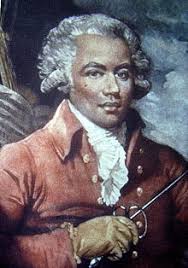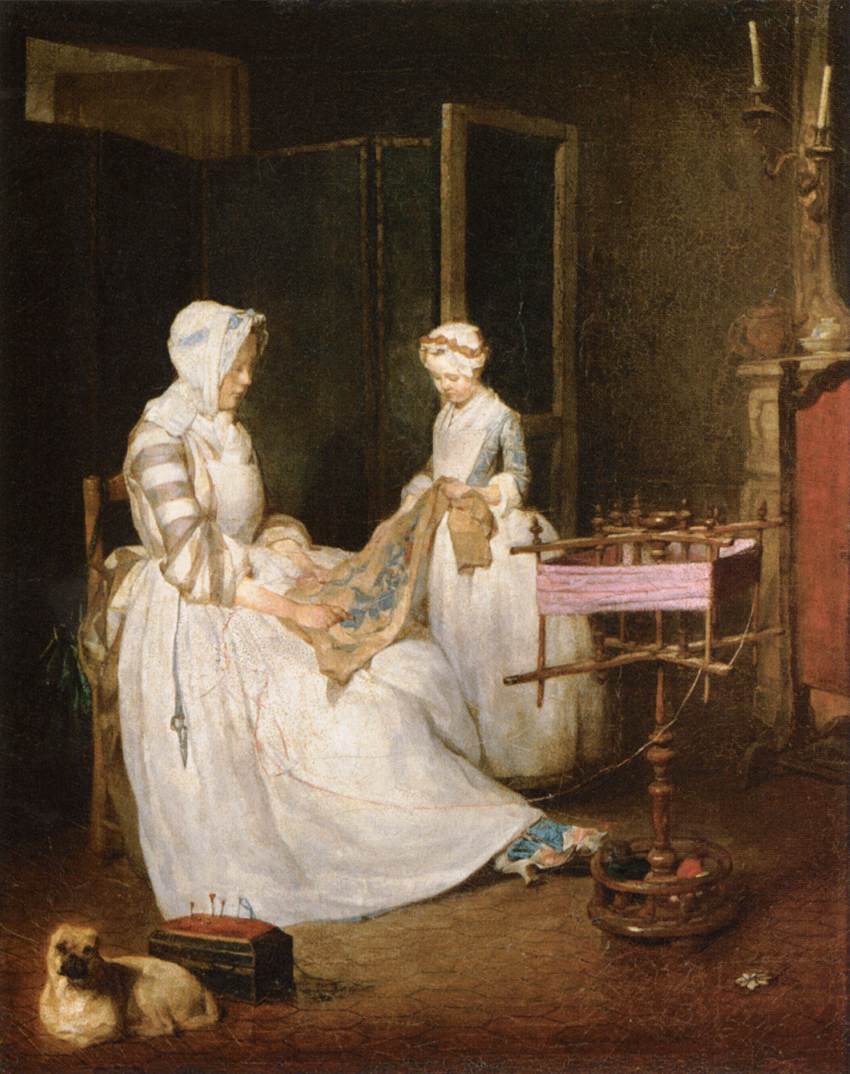|
Joseph Boulogne, Chevalier de Saint George was born in Basse-Terre, Guadeloupe on Christmas day 1745. His father, George de Bologne, was a prostestant planter, married with one daughter Elizabeth, and his mother was his father’s Senegalese slave, Nanon. According to the Black Code of 1685, had Boulogne not already been married, he would have been obliged to marry Nanon. Joseph was a ‘mulatto’, or a man of colour of the first degree. In 1759, the whole family, legitimate and unlegitimate, moved to Paris. Joseph received a first class education and distinguished himself in fencing and music. He made use of both skills during his lifetime, as a musician first, and as a soldier during the revolution. His musical career was both brilliant and thwarted. As a successful composer and a protege of Marie Antoinette, he was offered in 1775 the directorship of the Academie Royale, the Paris Opera. But two of its leading sopranos reportedly complain that they would not work under the leadership of a black man, so he was not appointed. The gossip columnist of the Correspondance wrote the following: No sooner were Mesdemoiselles Arnould, Guimard, Rosalie, and others informed about the news [that Saint-Georges had been proposed as music director of the Opéra], they presented a petition to the Queen, assuring her Majesty that “their honor and their delicate conscience could never allow them to submit to the orders of a mulatto.” Such an important consideration makes all the impression it is expected to make, but, after many projects and discussions regarding the matter, the question has been decided by the king, who in the end took it upon himself to have the Opéra managed on his behalf by the Intendants and Treasurers of the Menus Plaisirs `You can listen to Boulogne's music here: As his father had been raised to the aristocracy (taking the name Saint George) shortly before the family traveled to Paris, Joseph was welcome in high society. He was a close friend of Madame de Montesson and manager to her private theatre. There he met Olympe de Gouges, with whom he became friend. Perhaps the two collaborated in the Club des Amis des Noirs, of which they are sometimes said to have been founding members. Saint-George travelled to England in the late 1780s, and an attempt was made on his life there, perhaps because of his involvement with abolitionist movements. During the revolution he was made first captain of the national guard in Lille, then Colonel of the Black Legion, where he commanded black soldiers, amongst whom Alexander Dumas (père)’ father. His connections with the Duke d’Orleans and Dumouriez caused him to be suspende and emprisoned for 18 months, after which he traveled to Haiti to take part in the revolution there. He came back to Paris at the end of the 18thcentury and died in 1799 of bladder disease.
0 Comments
The first motto of the French Revolution was ‘Liberty, Equality’. Fraternity came later on, and was one of several third words that attached itself to the first two. The republican concept of equality was derived from that of liberty. To be free was to be free from domination. But those who have a lower status find it harder to escape domination. Hence, a republic requires that all should be equal in the eyes of the law, and that all should have the same status as free citizens. Unfortunately it turns out to be frighteningly easy to move from ‘equal political status for all’ to ‘equal political status for some’ and ‘equal status of some sort, but not political for some’. Women were excluded from the start from the Constitution. And people of colour who had benefitted from equal status in the colonies before the revolution found their equality reduced from ‘political’ to merely ‘civic’, and with no safeguards against the constant and illegal attacks on their civic liberties. One way to read this is to decide that ‘political equality’ is really too abstract to play the role of guarantor of republican liberty. What constitutes the real threat to liberty, what causes some people to be dominated by others, is economic inequality. The very poor have no choice but to sell themselves to the rich in whatever capacity the rich demand. And once sold, they have no choice but to put up with their employers’ capricious demands, because to protest would result in starvation for the whole family. So were Revolutionary republicans hypocritically ignoring the real causes of domination, and proposing an empty concept of equality that had no real grasp on the population they sought to address? That’s not true. But nor is it the case that French 18thcentury republicans believed in economic equality. They simply believed that great inequality was harmful, and that excessive wealth would be better redistributed to the poor. One example of an argument that great inequality causes domination and that wealth should be distributed in such a way to avoid it, but without any attempt at economic equality comes from Grouchy who proposes the following in her Letter VII: Let us suppose that laws should no longer support wealth inequality: then, even if justice and humanity were to be satisfied, cupidity, which takes more time and effort to eradicate, may persist. However is it not likely that the natural inequality caused by differences in behavior, degrees of intelligence, by the greater or lesser fecundity of families would result in the random distribution of three-quarters of resources and an equal distribution of the rest? Let us imagine, for instance, a country of six million families, and a land income of twelve hundred millions: each family would have two hundred pounds in annuity from the land. Even supposing that natural inequality absorbs three-quarters of that sum on behalf of the rich, wouldn’t fifty pounds remain for each family? Take a look at our peasantry, my dear C***, and ask yourself whether among those who have a fifty pounds income, many are reduced to a pressing need. It is well known, on the contrary, that as soon as they own two or three acres of crop, they earn a reputation for being well-off, and the average worth of two or three acres of the best soil for wheat, is around fifty pounds. In September 1787, Manon Roland was staying at Le Clos, the Roland family home in the countryside. She and her husband were about to take possession of the house, and she was beginning to renovate it, while Roland was working nearby in Lyon. Eudora, their daughter, was six years old. It’s very cold here, but our rooms are comfortable even without a fire, and one could easily spend the winter here. All that is missing are chairs, which will come on Friday, weather permitting, and the top of the book case, which would not fit on the first cartload. Our child is quite well behaved with me. I have established a schedule, and I think this is an excellent method. We wake up together at six: we get dressed, read catechism and do some needle work, all this together until eight. Then breakfast together, great happiness and play till half past nine. Then we go back upstairs and I write, while the child sews or knits till half-past eleven. Then play for her, but indoors, till twelve. At twelve, she chooses a book to read, then music lesson. Lunch at one. Play until three. Upstairs again then work or reading till five (keeping the readings short). A collation at five, then play till six, or later if we go out; otherwise we go in and she has another music lesson. She dines and goes to bed between seven and eight. I dine after eight and go to bed an hour later. Around the time that the guillotine was first tried, Sophie de Grouchy was finishing a draft of her Letters on Sympathy. The letters are a both a commentary and a response to Adam Smith’s Theory of Moral Sentiments in which the Scottish philosopher argued that morality arises out of our reactive attitudes and the sympathythat human beings naturally feel for each other. For Grouchy sympathy develops from the first relationship an infant experiences, that is from the proximity with another living body, and the dependence it develops with it. Because sympathy is developed through contact with others, it is natural that the Letters discuss crowd psychology: Amongst the effects of sympathy, we can count the power that a large crowd has to affect our emotions [...]. Here are, I believe, a few causes of these phenomena. First, the very presence of a crowd acts on us through the impressions created by faces, discourses, or the memory of deeds. The attention of the crowd commands ours, and its eagerness, forewarning our sensibility of the emotions it is about to experience, sets them in motion. This passage is reminiscent of the Roman Stoic philosopher Seneca’s Letter to Lucilius, in which he describes the powerful – and worrying – effect that crowds can have on the wisest, calmest of individuals. He writes how, on occasions when the emperor forced him to attend gladiator shows, his blood was raised and he too wanted to shout that one should die and another live. To consort with the crowd is harmful; there is no person who does not make some vice attractive to us, or stamp it upon us, or taint us unconsciously therewith. Certainly, the greater the mob with which we mingle, the greater the danger. Grouchy tried to pinpoint the cause of this response. It is the overwhelming presence of living bodies, all in one place, all speaking, moving, twitching in their own way, but at the same time all focusing their attention on the same point, which both confuses us and takes over our own sense of direction: we too want to look where they look, and we too are getting excited with the anticipation of what will happen there. The description of the effect of crowds in the Letterson Sympathyalso touches on the paradox of tragedy – why do we enjoy tragedy so, if we find other’s pain distasteful? The question is as old as Aristotle, who saw in tragedy a way to educate one’s emotion, to learn to understand and manage them. This is also where Grouchy is going here: In any case, we know that the spectacle of physical suffering is a real tragedy for the masses, a tragedy they seek only through a dumb curiosity, but whose sight sometimes arouses the kind of sympathy which can become a passion to contend with (Letter 4). No doubt Grouchy also has the spectacle of the public execution in mind here. When she first drafted the letters, executions were most commonly hangings, and they were always public, in France as elsewhere. People came to watch, and bought snacks and souvenirs, as they would at the theatre. And as we know, a year after writing this, she mingled with the crowds going to the guillotine, in order to visit her husband in hiding. |
About
This is where I live blog about my new book project, an intellectual biography of three French Revolutionary women philosophers. Categories
All
Archives
November 2022
|



 RSS Feed
RSS Feed